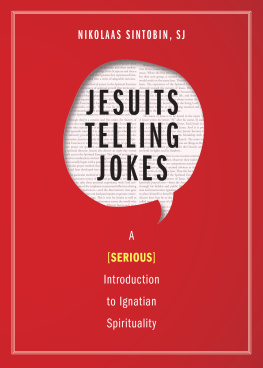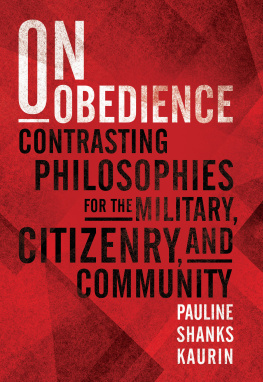Early Modern Jesuits between Obedience and Conscience during the Generalate of Claudio Acquaviva (15811615)
What we commonly mean by understand coincides with simplify [] We also tend to simplify history [] This desire for simplification is justified, but the same does not always apply to simplification itself. It is a working hypothesis, useful so long as it is recognised as such and not mistaken for reality ; the greater part of historical and natural phenomena is not simple, or not simple with the simplicity that we would like.
(Primo Levi, La zona grigia, in I sommersi e i salvati, 1986)
Saper leggere il libro del mondo
con parole cangianti e nessuna scrittura
nei sentieri costretti in un palmo di mano
i segreti che fanno paura
finch un uomo ti incontra e non si riconosce
e ogni terra si accende e si arrende la pace
(Fabrizio De Andr, Khorakhan, 1996)
Early Modern Jesuits between Obedience and Conscience during the Generalate of Claudio Acquaviva (15811615)
SILVIA MOSTACCIO
Catholic University of Louvain, Belgium
Translated by Clare Copeland
Preface by Flavio Rurale
First published 2014 by Ashgate Publishing
Published 2016 by Routledge
2 Park Square, Milton Park, Abingdon, Oxon OX14 4RN
711 Third Avenue, New York, NY 10017, USA
Routledge is an imprint of the Taylor & Francis Group, an informa business
Copyright Silvia Mostaccio 2014
Silvia Mostaccio has asserted her right under the Copyright, Designs and Patents Act, 1988, to be identified as the author of this work.
All rights reserved. No part of this book may be reprinted or reproduced or utilised in any form or by any electronic, mechanical, or other means, now known or hereafter invented, including photocopying and recording, or in any information storage or retrieval system, without permission in writing from the publishers.
Notice:
Product or corporate names may be trademarks or registered trademarks, and are used only for identification and explanation without intent to infringe.
British Library Cataloguing in Publication Data
A catalogue record for this book is available from the British Library
Library of Congress Cataloging-in-Publication Data
Mostaccio, Silvia.
Early modern Jesuits between obedience and conscience during the generalate
of Claudio Acquaviva (15811615) / by Silvia Mostaccio.
pages cm
Includes bibliographical references and index.
ISBN 978-1-4094-5706-0 (hardcover : alk. paper)
ISBN 978-1-4094-5707-7 (ebook) ISBN 978-1-4724-0727-6 (epub)
1. Jesuits Italy History 16th century. 2. Jesuits Italy History 17th
century. 3. Acquaviva, Claudio, 15431615.
I. Title.
BX3704.5.M67 2014
271.53045dc23
2013051052
ISBN: 978-1-409-45706-0 (hbk)
ISBN: 978-1-315-57848-4 (ebk)
Contents
Preface
From the outset of this book, the reader is openly invited to take a less than obvious journey, a journey along minor roads that function as short cuts by linking major urban arteries, an itinerary that tracks the boundary between what is within and what is outside. This boundary is not physical or geographical, however, but has to do with man, his culture, his beliefs and his system of values. We are at the start of the modern period and the journey that we will undertake is to travel within the individual, into his conscience, and to compare what we find there with what is outside of him, that is to say, the other: the authority to whom obedience is or is not due, or the indigenous peoples from distant lands in an age of discovery. These are the two different, but complementary, senses of the other: that which is outside the individual and is very different from him, which demands reflection, asks for responses, and feeds the critical spirit (as Montaigne taught us).
It is the individual, therefore, who is at the centre of the journey we will undertake in this book. Indeed, it could not be otherwise after the devastating events that led from the Great Schism of the West to Luther by way of the desacralisation of the ecclesiastical tradition enacted by humanism. These were events that opened the path to a modern religious psychology based on the primacy of a subjective conscience.
The theme proposed here is essentially that of the transition to modernity, with its strong sense of individuality, where subjectivity was destined to become a dimension of every decision made. Is it possible to understand this transition, to define its contours by stepping away from the traditional path (Renaissance, Reformation, Enlightenment, Revolution) and instead follow a different route? Is it possible to recover the role played by reflection and internal experiences that emerged within the religious sphere (first Christian, then Catholic) and on which some exponents of fifteenth-century humanism pounced? This book invites us to free ourselves from the clichs and traditional approaches and rather to open ourselves to reading particular paradoxical features. The author has thrown down the gauntlet and set us all a challenge by deciding to travel down the road to modern liberty of conscience by tackling the topic of Jesuit obedience.
This volume fits within a seam of scholarship that is finally liberating itself from an anti-Jesuit prejudice fed by that envy of the Reformation that has characterised the historiographical anomaly which is Italy. How far, instead, was it the worst ostracism deployed by the most conservative elements of the Counter-Reformation Church that prevailed after the post-Napoleonic restoration?
This, it seems, is the question we must tackle. In the period between the mid-sixteenth to late-seventeenth centuries, did the work of the Jesuits in particular their educational system perhaps not serve to accept (and preserve) the achievements made by the ruling class in the preceding century on an even bigger scale than they had enjoyed before? And was Ignatian spirituality that is, self-examination, self-awareness and reinforcement of the self, as much for the clergy as for lay-people, women included not extremely important to this process? Indeed, one of the possible courses open after the encounter between humanists and the Roman Church was that of a new synthesis between the outcomes of critical studies and dogmas of faith, based on the certainty of their compatibility: the way of Christian humanism. These are the themes which Silvia Mostaccio examines in this book.
But there is something more here because the individual is part of a community: he or she is inserted into that community, and acts within it. Starting in the fifteenth century, the disorientation induced by a sense of liberty (of conscience) triggered personal and collective crises, but above all it provoked revolts, conflicts and war. Luther knew that to guarantee social order he needed to substitute the authority of the pope with royal power of divine origin, thereby imprisoning Christian communities in the temporal body of the political or national community, submitting them ultimately to the authority of the princes he detested.
What more might one ask of the society and people of this period? Perhaps, to our eyes, these years marked a step back from the lay progress made earlier by humanism. But were other periods not marked by something similar? Was there not another time when ideas and values shared by a minority were then lost in the twists and turns of history and only later, with the distance of time, could they flourish and, once recovered, be welcomed by the majority as essential elements of a new (and better) social and political system? Has something similar not happened to us in the twentieth century when the Marxist utopia and its aspiration for a more just society founded on equality put to one side and we instead became used to the unhealthy and socially unjust world in which we live? Although our conscience is undeniably attracted to this utopia, the attraction is not strong enough to move us consistently in that direction. This, of course, is precisely an example of history taking side-paths rather than a direct route.












